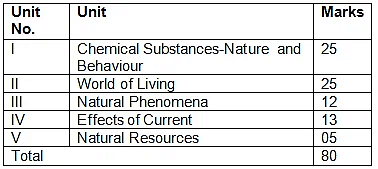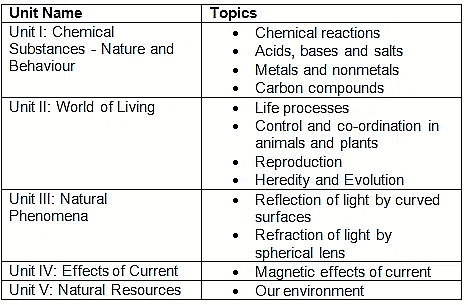Case Based Questions for Class 10 Science PDF Download
CBSE Case Study Questions for Class 10 Science
If you are in search of case study questions for CBSE Class 10 Science, you have come to the right place. We are offering chapter-wise case study questions for CBSE Class 10 Science. These questions are based on passages given, and are designed to help students practice and improve their marks in the exam.
Chapter Wise CBSE Case Study Questions for Class 10 Science
Chapter Wise CBSE Case Study Questions for Class 10 Science are questions that are designed to test a student's understanding of scientific concepts and their ability to apply them to real-world situations. These questions are based on the chapters in the Class 10 Science syllabus and are typically presented in the form of a case study or a scenario.
CBSE Case Study Questions for Class 10 Science Chapter 1: Chemical Reactions and Equations
CBSE Case Study Questions for Class 10 Science Chapter 2: Acids, Bases and Salts
CBSE Case Study Questions for Class 10 Science Chapter 3: Metals and Non-metals
CBSE Case Study Questions for Class 10 Science Chapter 4: Carbon and its compounds
CBSE Case Study Questions for Class 10 Science Chapter 5: Life Processes
CBSE Case Study Questions for Class 10 Science Chapter 6: Control and Coordination
CBSE Case Study Questions for Class 10 Science Chapter 7: How do Organisms Reproduce?
CBSE Case Study Questions for Class 10 Science Chapter 8: Heredity and Evolution
CBSE Case Study Questions for Class 10 Science Chapter 9: Ray Optics - Light : Reflection and Refraction
CBSE Case Study Questions for Class 10 Science Chapter 10: The Human Eye and the Colourful World
CBSE Case Study Questions for Class 10 Science Chapter 11: Electricity
CBSE Case Study Questions for Class 10 Science Chapter 12: Our Environment
CBSE Case Study Questions for Class 10 Science Chapter 13: Magnetic Effects of Current
CBSE Case Study Questions for Class 10 Science Chapter 14: Sustainable Management of Natural Resources (Only for Internal Assessment)
CBSE Case Study Questions for Class 10 Science Chapter 15: Periodic Classification of Elements (Old Syllabus)
CBSE Case Study Questions for Class 10 Science Chapter 16: Sources of Energy (Old Syllabus)
Weightage of CBSE Case Study Questions in Class 10 Science


Why are Case Study Questions important in Science Class 10 ?
Case study questions are important in Science Class 10 for several reasons:
- Develops problem-solving skills: Case study questions require students to apply their knowledge to solve real-world problems. This develops their problem-solving skills and helps them to think critically.
- Enhances analytical skills: Case study questions involve analyzing a given scenario or problem and applying scientific concepts to find a solution. This helps students to develop their analytical skills and improves their ability to apply scientific concepts to real-world situations.
- Improves retention and understanding: Case study questions require students to apply the concepts they have learned in the chapter to solve problems. This helps them to better understand the concepts and retain them for a longer period.
- Enhances communication skills: Case study questions often require students to explain their thought process and reasoning. This improves their communication skills and helps them to articulate their ideas more clearly.
- Prepares for competitive exams: Case study questions are often included in competitive exams such as the Olympiad, NTSE, and JEE. Practicing case study questions in Class 10 Science helps students to prepare for these exams and enhances their chances of success.
Overall, case study questions are an effective way to engage students in Science Class 10 and develop their problem-solving, analytical, and communication skills. They also help students to apply scientific concepts to real-world situations and prepare them for higher-level science education.
Class 10 Science Curriculum at Glance
The Class 10 Science curriculum covers a wide range of topics that provide students with a solid foundation in scientific concepts. Here is a brief overview of the Class 10 Science curriculum:
- Chemical Reactions and Equations: Types of chemical reactions, balancing chemical equations, and the concept of oxidation and reduction.
- Acids, Bases, and Salts: Properties of acids and bases, pH scale, and preparation and properties of salts.
- Metals and Non-Metals: Physical and chemical properties of metals and non-metals, their reactions with water, acids, and other substances, and corrosion of metals.
- Carbon and Its Compounds: Covalent bonding in carbon compounds, properties of carbon compounds, and some important carbon compounds such as ethanol, ethanoic acid, and ethene.
- Periodic Classification of Elements: The history of the periodic table, modern periodic law, and the periodic trends in properties of elements.
- Life Processes: Basic concepts of nutrition, respiration, transport, and excretion in living organisms, and their mechanisms.
- Control and Coordination: The nervous system, the endocrine system, and their role in control and coordination in humans and other animals.
- How Do Organisms Reproduce?: Reproduction in animals and plants, modes of reproduction, and reproductive health.
- Heredity and Evolution: Basic concepts of heredity, inheritance patterns, and the role of variations in evolution.
- Light - Reflection and Refraction: Reflection and refraction of light, spherical mirrors, lenses, and their applications.
- Human Eye and Colourful World: The structure and functioning of the human eye, the correction of vision defects, and the concepts of dispersion and scattering of light.
- Electricity: Electric current, electric potential, electric circuits, and the heating effect of electric current.
- Magnetic Effects of Electric Current: Magnetic field, magnetic field lines, magnetic field due to a current-carrying conductor, and the concept of an electromagnet.
- Sources of Energy: Different sources of energy, conventional and non-conventional sources of energy, and their advantages and disadvantages.
- Our Environment: Ecosystem, food chains and food webs, and environmental issues such as pollution and depletion of resources.
- Sustainable Management of Natural Resources: Conservation of natural resources, management of forests and wildlife, and sustainable management of resources.
The Class 10 Science curriculum provides a strong foundation in scientific concepts and prepares students for higher-level science education.
Students can also access CBSE Case Study Questions of all subjects of Class 10:
- CBSE Case Study Questions for Class 10 Mathematics
- CBSE Case Study Questions for Class 10 Social Science SST
- CBSE Case Study Questions for Class 10 English
- CBSE Case Study Questions for Class 10 Hindi
- CBSE Case Study Questions for Class 10 Sanskrit
Frequently Asked Questions (FAQs): CBSE Case Study Questions for Class 10 Science
What are case-based questions for Class 10 Science?
Case-based questions for Class 10 Science are problem-solving exercises that present real-world scenarios or situations using scientific concepts and require the student to analyze and apply their scientific knowledge and skills to solve the problem.
How can case-based questions for Class 10 Science help me prepare for my exams?
Case-based questions for Class 10 Science can provide a practical and interactive way for students to apply their scientific knowledge and skills to real-world scenarios. It can help students to understand the concepts better and improve their problem-solving abilities.
What types of topics are covered in case-based questions for Class 10 Science?
Case-based questions for Class 10 Science typically cover all the topics and chapters in the Class 10 Science curriculum, including physics, chemistry, and biology.
FAQs on Case Based Questions for Class 10 Science
| 1. What are CBSE Case Study Questions for Class 10 Science? |  |
| 2. How are CBSE Case Study Questions weighted in Class 10 Science exams? |  |
| 3. Why are Case Study Questions important in Science Class 10? |  |
| 4. Can you provide an example of a Class 10 Science Case Study Question? |  |
| 5. How can students prepare for CBSE Case Study Questions in Class 10 Science? |  |

|
Explore Courses for Class 10 exam
|

|

















